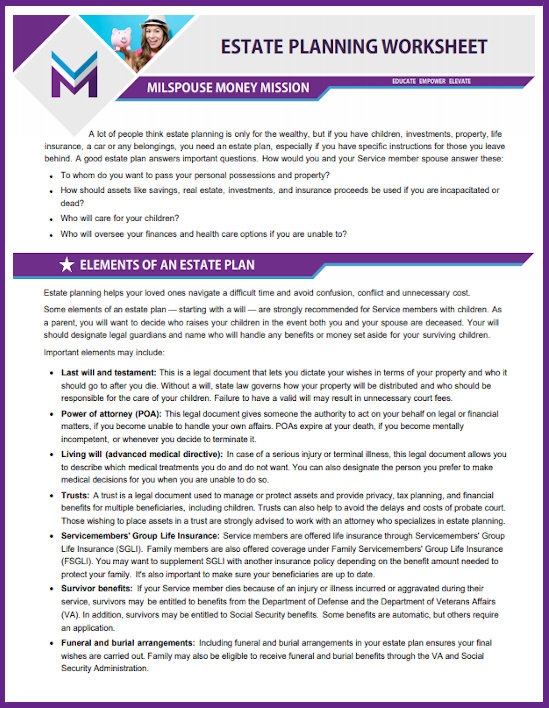Get Started
Congratulations on your new addition! Welcoming a new child into your family is very exciting, but it also brings many changes, big and small.
Congratulations!
Financial Planning
Here we’ve gathered resources to help guide you through the administrative and financial aspects of bringing your child into the military community.
Financial Planning Considerations
Resources
Learn about the resources available within the military community. There are sources of support and information available online and at each installation.
Know What's Available
1
Getting Started
There are four tasks or steps to take care of as soon as you bring your new bundle of joy home. These will help your transition go more smoothly.
Step 1
Enroll your child in the Defense Enrollment Eligibility Reporting System (DEERS). Make sure you have an official, notarized copy of the child’s birth certificate. This must be done in person.
For more information on DEERS enrollment, visit this link.
Step 2
Check your spouse’s Leave and Earnings Statement (LES) to make sure the correct pay and allowances are reflected. Remember, if you notice any over payments, they are not baby gifts and need to be paid back.
Step 3
Apply for a Social Security card for your child. This can be completed online. Visit ssa.gov for more information.
Step 4
Update legal documents. Consider who you want as a guardian to take care of your child if you are not able to. Base legal or civilian counsel can help you create an estate plan that reflects your wishes. Do not wait until right before your spouse deploys or goes on temporary duty (TDY) to complete this. Sometimes these documents take time to set up. To learn more about the five key estate planning documents, visit Money Ready 401: Plan Your Estate.
For a quick reference to learn key definitions and resources, download the PDF handout by clicking on the image below.
A special note for adoptive parents: Military families may qualify for partial reimbursement of adoption-related expenses. More information is provided here, under the Defense Finance and Accounting Service website.
Learn from Tessa who has some financial tips to prepare for parenthood and your new baby.

2
Financial Planning Considerations
The United States Department of Agriculture (USDA) estimates that the average cost of raising a child from birth to 18 is about $233,600. It is safe to assume that your new bundle of joy isn’t born with a bundle of cash to cover their expenses, so what can you do? Plan and build a budget that reflects this new stage of your life, and follow these steps:
Step 1
Make a budget. Your cash flow needs will change significantly, so you need to adjust your budget to reflect your family’s changing needs. Visit our budgeting resources, budgeting blog, and videos for guidance.
On the cash inflow side, factor in reductions to your income if you and/or your spouse will take unpaid maternity or paternity leave, or if one spouse will become a stay-at-home parent.
On the outflow side, there will be one-time expenses, like a crib and a car seat, but there will also be recurring costs for diapers, clothes, and child care. It pays to be a smart shopper! Visit our blog on 17 Smart Ways to Reduce Spending. In addition, consignment stores and re-sale events can be great places to buy baby necessities at lower prices.
Step 2
Enroll in financial assistance programs if you qualify. Your installation’s New Parent Support Program can help you access a wealth of resources, including financial and developmental assistance and support.
Step 3
Attend a financial workshop for new parents. Find out what resources are available at your installation. If you do not live close to an installation, resources are available online through Military OneSource. To locate a Personal Financial Manager, visit https://installations.militaryonesource.mil/.
Step 4
Adjust your budget for major purchases, such as a new house and/or vehicle. You may need a bigger home or family vehicle with your new addition. Include these needs as you create your new spending plan. Be better prepared to purchase your home by viewing, Five Rules for Buying a House. Get tips on car buying and auto loans by watching the videos under Major Purchases.
Build an Emergency Fund
One major financial planning consideration often overlooked is building savings for an emergency. Let’s face it, unexpected expenses always come up especially when you have children! Even if you can only save a small amount like $10 or $20 a month, put it aside and let it build. The more you can do, the better, but every little bit helps! You will be grateful to have cash set aside when the washing machine needs a repair, or the fridge goes out. Watch the video below to understand why emergency funds are so important.

Paying for College
We’ve already talked about how expensive it is to raise a child today, but there is another big expense we have not talked about — college!
According to recent studies, the average annual cost (tuition, housing, books and supplies) for the 2019-20 academic year was $21,950. Like any other major purchase, this is a great deal of money, but do not get discouraged. Visit our Funding College page for great information on ways to pay for college, including tax-advantaged savings plans, financial aid, scholarships, the post-9/11 GI Bill, and student loans. Remember that every family’s situation is different. You may use a combination of sources to cover college and don't forget to start planning early!
You may have heard the phrase, “learn more, earn more.” Studies show that the average person with a bachelor’s degree earns about $22,000 more per year than someone with a high school diploma.
And while you may be thinking it’s too early to start considering college costs, the sooner you start saving, the better off you will be. For more information on the types of accounts to use for college savings, visit College Savings Plan Choices.
To learn even more, visit Money Ready: Fund College.
In this video, Maria, an Army spouse, talks about the importance of saving for your child’s education early…like in the first year, if possible!

Insurance
Your insurance coverage is another area of your life that will require adjustments with a new child. This includes health and life insurance. Money Ready: Insure Your Family provides a broad overview of what insurance is and why it is important. Let’s dive in for more specifics.
Tricare
TRICARE is the military’s health insurance provider. Above, we discussed that one of the first things you will do is enroll your child in DEERS. Your child must be enrolled in DEERS to be covered under TRICARE. You have 90 days (stateside) and 120 days (overseas) from the birth to enroll your child in TRICARE or you will have to wait until the next open season or life event.
Click here for information on the types of plans available under TRICARE.
If you are a spouse working in the private sector with coverage through your job, compare your coverage with TRICARE. Also, if you plan to stop working, make TRICARE your primary insurance coverage.
Coverage for reserve members requires continuous, regular payments to stay enrolled. Drill pay can be irregular, so make sure you’re up to date on your premiums to avoid a lapse in coverage. If you have civilian coverage, compare plan costs with TRICARE to see where you can get the better deal.
Finally, for both active duty and reserve, do not forget to include dental coverage.
Once you’re enrolled in a plan, TRICARE covers well-child care for your newborn from birth through 5 years of age. This includes:
- Circumcision before leaving the hospital
- Routine newborn care
- Height, weight, and head circumference
- Immunizations
- Developmental and behavioral assessment
- Comprehensive health promotion and disease prevention exams
- Vision and hearing screenings
You will make your baby's first well-child appointment before you leave the hospital.
Breast Pumps and Supplies
Did you know that TRICARE covers breast pumps and breast pump supplies at no cost for new mothers? It's true! This benefit is also offered to mothers who adopt an infant and plan to breastfeed.
Banked Donor Breast Milk
Banked donor milk is an option if an infant is critically ill, when the mother’s breast milk isn’t available, or there isn’t enough milk. TRICARE covers banked donor milk for certain conditions and situations.
For more information on all of these benefits, visit TRICARE: Newborn & Well-Baby Care.
Life Insurance
Life insurance can be a difficult topic to discuss. It is hard to think about a time when you might not be around to take care of your family. The right amount of life insurance can help you feel comfortable that your family will be taken care of. How much do you need? There is no one-size-fits-all solution, so use the acronym L-I-F-E to calculate how much you need.
► L — Liabilities
► I — Income to be Provided
► F — Final Expenses
► E — Education/Other Goals
Add these values up, subtract any assets and your needed life insurance coverage should be a bit greater. Your service member likely has coverage through SGLI and family coverage is available through FSGLI.
- SGLI stands for Servicemembers' Group Life Insurance and eligible Service members are automatically enrolled upon joining the military. This is term life insurance, meaning the coverage is good for a specific period. Coverage applies as long as the Service member is on active duty, and for 120 days after separation from service. The premium is automatically deducted monthly, and the default level of protection is $400,000. Service members can make changes such as declining or reducing the benefit and changing beneficiaries. For more information, please visit https://www.benefits.va.gov/insurance/sgli.asp.
- FSGLI stands for Family Servicemembers' Group Life Insurance and is offered through the military to cover the family. Spouses receive a maximum of $100,000 of coverage for a premium that varies by age but is less than $10 per month for most people. Dependent children under 18 receive $10,000 of coverage at no cost.
Once you’ve decided on the best coverage to meet your growing family’s needs, make sure that your beneficiary information is up to date to reflect any changes you may want to make now that you have a child.
Review this document on Life Insurance Types of Plans for more information.
Other Considerations
We have covered a great deal of information on how a new baby will impact your financial life. There are two more areas we’ll touch on briefly.
- Monitor your credit score. As a new parent, you may open a new line of credit. Review our Understanding Credit page to make sure you use it wisely. Children can sometimes be the target of identity thieves. Click here for more information and ways to protect your family.
- Your income taxes may change. Everyone’s situation is different, so it is best to meet with a financial counselor or a representative at your installation’s Tax Center or at a Volunteer Income Tax Assistance office near you for guidance. For additional help, visit Military OneSource MilTax Tax Services at https://www.militaryonesource.mil/financial-legal/tax-resource-center/tax-services-benefits.
Having a new baby can bring a lot of change to your family. We hope this information will help you prepare and adjust your finances to keep on track with your goals.
Before you go, listen to Thorunn who has some new parent resources to share with you.

3
Resources
Relief Societies
Service relief societies offer support when military families need it most. These nonprofit organizations support military families with both necessities and emergency needs. Simply click on the links below:
Recent Blogs
March Money Moves: Navigating Tax Season While Preparing for Summer Fun
As we welcome the arrival of spring and the promise of warmer weather, it’s easy to get caught up in thoughts of summer plans and family vacations. But with tax season in full swing, it’s important to balance excitement for the upcoming months with a push to wrap up tax season. While those topics couldn’t…
Read MoreCommunicating with Your Partner About Finances: A February Focus on Financial Wellness
Talking Money with Your Partner As we celebrate loving relationships this month, it’s important to remember that not all conversations come up roses between couples. Sometimes discussing finances can be tricky and stir up negative emotions. Open communication about money is vital for building trust and nurturing a healthy relationship. Whether you’re a new couple…
Read MoreBuild Financial Wellness from the Ground Up in 2025
There’s something magical about the ball dropping at midnight and turning the page to a new year. For an instant, it feels like you’ve got a clean slate, and anything is possible. In some ways that’s true, but as the calendar page turns, your responsibilities, bills and financial challenges remain. Many people make resolutions to…
Read More5 Financial Resolutions to Start the New Year Off Right
You don’t need to wait until January to take a fresh look at your finances. Get a jump on the new year with these five resolutions — they can really pay off over the next 12 months. 1. Set/update your budget Setting a budget is the first step in a military family’s financial planning. And…
Read More5 Financial Power Moves for MilSpouses
During National Veterans and Military Families Month in November, we salute the strength of our families as they support the mission of our community. MilSpouses, especially, display determination as they face the challenges of military life. We see you navigate frequent moves, deployments and often raising children as a solo parent. We understand your motivation…
Read MoreThe Year In Review: Bring Your Financial Picture into Focus
It can be fun and even eye-opening to watch those year-end montages reminiscing about the year. If you ever have that moment when you say to yourself, “Wait, that was this year?”, you could also imagine how easy it could be to lose track of the goals and financial plans you set in motion when…
Read MoreNow’s the Time to Think About Life Insurance
Hey, MilSpouses, it’s Life Insurance Awareness Month! Okay, so maybe that doesn’t make you want to break out the cake and ice cream, but life insurance is an important part of your financial plan. It can help take care of your family, giving them financial security if something happens to you or your service member.…
Read MoreBudget and Insurance: What to Do After You PCS
After months of planning and hard work, you’ve landed safely at your next duty station. Congratulations! As you kick off this next chapter in your MilLife, it’s a good time to check in on your finances. Let’s look at two key items that are likely to change after a PCS: your budget and your insurance.…
Read More










